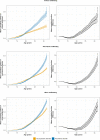Psychiatric illness and the risk of reoffending: recurrent event analysis for an Australian birth cohort
- PMID: 37221485
- PMCID: PMC10207651
- DOI: 10.1186/s12888-023-04839-0
Psychiatric illness and the risk of reoffending: recurrent event analysis for an Australian birth cohort
Abstract
Background: Psychiatric illness is a well-established risk factor for criminal justice system involvement, but less is known about the relationships between specific psychiatric illnesses and reoffending. Research typically examines reoffending as a single discrete event. We examined the relationship between different psychiatric disorders and types of reoffending while accounting for multiple reoffending events over time.
Methods: Data were drawn from a population cohort of 83,039 individuals born in Queensland, Australia, in 1983 and 1984 and followed to age 29-31 years. Psychiatric diagnoses were drawn from inpatient health records and offending information was drawn from court records. Descriptive and recurrent event survival analyses were conducted to examine the association between psychiatric disorders and reoffending.
Results: The cohort included 26,651 individuals with at least one proven offence, with 3,580 (13.4%) of these individuals also having a psychiatric disorder. Individuals with any psychiatric disorder were more likely to reoffend compared to those without a disorder (73.1% vs. 56.0%). Associations between psychiatric disorders and reoffending varied across age. Individuals with a psychiatric disorder only started to accumulate more reoffending events from ~ 27 years, which accelerated up to age 31 years. There were both specificity and common effects in the associations between different psychiatric disorders and types of reoffending.
Conclusions: Findings demonstrate the complexity and temporal dependency of the relationship between psychiatric illness and reoffending. These results reveal the heterogeneity present among individuals who experience psychiatric illness and contact with the justice system, with implications for intervention delivery, particularly for those with substance use disorders.
Keywords: Mental illness; Recidivism; Record linkage; Substance use disorders; Survival analysis.
© 2023. The Author(s).
Conflict of interest statement
The authors declare that they have no competing interests.
Figures



Similar articles
-
Psychiatric disorders and offending in an Australian birth cohort: Overrepresentation in the health and criminal justice systems for Indigenous Australians.Aust N Z J Psychiatry. 2022 Dec;56(12):1587-1601. doi: 10.1177/00048674211063814. Epub 2021 Dec 9. Aust N Z J Psychiatry. 2022. PMID: 34881665
-
Examining the health and criminal justice characteristics for young people on compulsory community treatment orders: An Australian birth cohort and data linkage study.Int J Law Psychiatry. 2022 Jul-Aug;83:101813. doi: 10.1016/j.ijlp.2022.101813. Epub 2022 Jun 24. Int J Law Psychiatry. 2022. PMID: 35759935
-
Mental health disorders, adverse childhood experiences and accelerated reoffending among justice-involved youth in Australia: A longitudinal recurrent event analysis.Int J Law Psychiatry. 2025 Jul-Aug;101:102099. doi: 10.1016/j.ijlp.2025.102099. Epub 2025 Apr 25. Int J Law Psychiatry. 2025. PMID: 40286634
-
Psychiatric disorders and reoffending risk in individuals with community sentences in Sweden: a national cohort study.Lancet Public Health. 2023 Feb;8(2):e119-e129. doi: 10.1016/S2468-2667(22)00312-7. Epub 2023 Jan 17. Lancet Public Health. 2023. PMID: 36669512 Free PMC article.
-
Mandatory substance use treatment for justice-involved persons in Germany: a systematic review of reoffending, treatment and the recurrence of substance use outcomes.Front Psychiatry. 2024 Feb 5;14:1217561. doi: 10.3389/fpsyt.2023.1217561. eCollection 2023. Front Psychiatry. 2024. PMID: 38375516 Free PMC article.
Cited by
-
Acceptability and feasibility of Problem Management Plus to address mental health problems among remand prisoners in the Netherlands: a pilot randomised controlled trial protocol.Health Justice. 2025 May 13;13(1):31. doi: 10.1186/s40352-025-00341-9. Health Justice. 2025. PMID: 40358872 Free PMC article.
-
Psychiatric admissions in young people after expiration of criminal justice supervision in Australia: a retrospective data linkage study.BMJ Ment Health. 2024 Mar 27;27(1):e300958. doi: 10.1136/bmjment-2023-300958. BMJ Ment Health. 2024. PMID: 38538031 Free PMC article.
-
The cost-effectiveness of mental health interventions amongst prison populations: a systematic review (research letter to the editor).J Forens Psychiatry Psychol. 2024 May 10;35(4):622-628. doi: 10.1080/14789949.2024.2350515. eCollection 2024. J Forens Psychiatry Psychol. 2024. PMID: 38983758 Free PMC article.
-
Examining the timing of mental health contacts across female offending trajectories.Health Justice. 2025 May 15;13(1):34. doi: 10.1186/s40352-025-00338-4. Health Justice. 2025. PMID: 40372561 Free PMC article.
-
Personality disorders, violence and antisocial behaviour: updated systematic review and meta-regression analysis.Br J Psychiatry. 2025 Jul;227(1):481-491. doi: 10.1192/bjp.2024.226. Br J Psychiatry. 2025. PMID: 39659141 Free PMC article. Review.
References
-
- Stewart A, Ogilvie JM, Thompson C, Dennison S, Allard T, Kisely S, Broidy L. Lifetime prevalence of mental illness and incarceration: an analysis by gender and indigenous status. Aust J Soc Issues. 2021;56(2):244–268. doi: 10.1002/ajs4.146. - DOI
-
- Simpson AI, McMaster JJ, Cohen SN. Challenges for Canada in meeting the needs of persons with serious mental illness in prison. J Am Acad Psychiatry Law. 2013;41(4):501–9. - PubMed
Publication types
MeSH terms
Supplementary concepts
LinkOut - more resources
Full Text Sources
Medical

